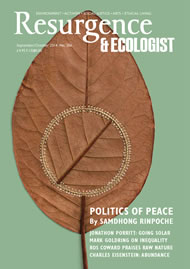The importance of this book lies in its comprehensive approach to the most challenging and complex problem of our time. It is organised in five parts: the rise in fossil fuel use and how the political process is failing to curb it; why the use of oil, coal and gas must be tackled head-on; the social, economic, cultural, political and psychological barriers to action; drivers of climate change other than fossil fuels; and key steps to tackle climate change.
The main message of the book is stark: if we wish to avoid catastrophic climate change, more than half of the fossil fuels in current reserves will have to remain in the ground and not be burned. The book’s great merit is that it not only explains in clear language and much detail why this must be so, but also examines why, in spite of all that has been attempted, emissions of carbon at the global level have continued their inexorable exponential rise, and why we have been so reluctant to take meaningful action.
Fossil fuels cannot be phased out until alternative energy sources are available, but the authors argue that this by itself is unlikely to be sufficient without at the same time limiting the production of fossil fuels directly through some form of global carbon tax or worldwide cap-and-trade scheme. Oliver Tickell is acknowledged to be an “early advocate of regulating carbon emissions ‘upstream’” – as close to the point of extraction as possible – but it is claimed that such a scheme, in which carbon permits are sold at auction, “would raise huge sums of money, begging the question of what should be done with it all”, overlooking the very practical suggestions that Tickell makes in his book Kyoto2 about how the estimated US$1 trillion could be allocated to tackle the causes and consequences of climate change.
The most disappointing section of the book is the one dealing with renewables, which covers less than two pages even though renewables are recognised as “absolutely crucial” as long as they are combined with carbon regulation to make sure they substitute for fossil fuels rather than simply add to global energy supply. The section on nuclear options runs to four pages and comes to the conclusion that “we’d be foolish to limit our options” – hardly a ringing endorsement.
The authors are clear that unexploited fossil fuels will in time become a financial liability to their investors, so that it is perhaps not such a surprise that they spend “almost half a billion dollars on campaign donations and lobbying every year”. Campaigns to disinvest from the sector are growing – “fossil fuel production now has an unavoidable moral dimension, much like other controversial sectors such as firearms and tobacco.”
Ways of removing carbon from the air (which in principle could return the atmosphere to pre-industrial levels) include zero-tillage arable farming, which enhances soil fertility. Another possibility, although the authors point out that it has no independent scientific backing, is the claim by Allan Savory that the process of desertification can be reversed by introducing livestock and establishing pastures, which would also address the growing demand for meat. Too good to be true? (Read George Monbiot’s Guardian blog, 4 August 2014): www.theguardian.com/environment/georgemonbiot/2014/aug/04/eat-more-meat-and-save-the-world-the-latest-implausible-farming-miracle
The final chapter of the book suggests that everyone has a key role to play – “doing something is better than doing nothing” – but in view of the authors’ earlier insistence that the use of fossil fuels must be tackled head-on and carbon emissions explicitly constrained, and that this will require sustained pressure from the public, surely the most important thing we all should do is contribute to that pressure. The worldwide campaigning group 350.org, set up by Bill McKibben who wrote the Foreword, could focus on that objective coupled with promoting renewables.
The book concludes that if we keep on as we are, “that would mean taking a monumental gamble with our children’s future and a species as intelligent as ours surely wouldn’t do that. Would it?” But it seems likely that it would: a report by BP cited in The Guardian in January 2014 predicts that global emissions of greenhouse gases will rise 29% by 2035.








